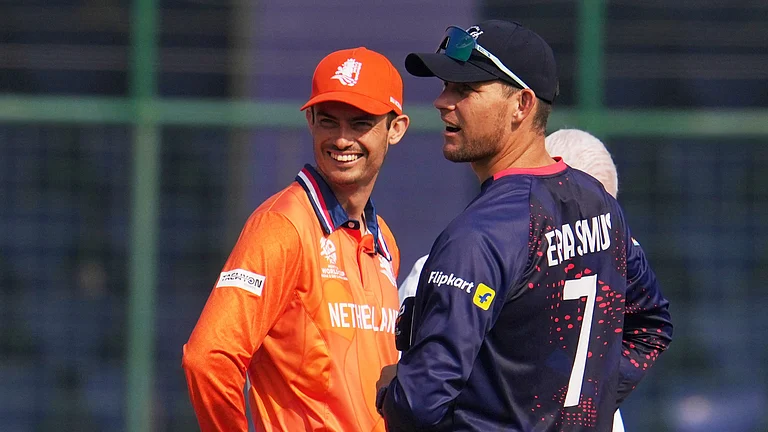Close by, a group of men including two policemen are enjoying the scene. The last time they helped women patrol the village borders (in neighbouring Wanevadi) to ensure that drunk men don’t enter, the enthusiasm had led to some men being stripped. Murum’s women, who for years bore alcoholism and abuse silently, are now standing up not only against their own husbands but against a village full of men wasted by alcohol. Over the last month, women in this dusty village—which lives off the sugarcane factory nearby—have beaten up their men, destroyed liquor shops, emptied out bottles, burnt gutkha packets and made melodramatic anti-alcohol speeches from loudspeakers besides the diligent patrolling to keep away the spirits.
How have these middle-aged, semi-literate mothers been able to put the fear of God, and women, in their men, who traditionally were afraid of neither?
"If men beat men, it’s still okay. But it is really shameful for men to be beaten up by women," says Wagmode, a local cop with a bushy white moustache and twinkling eyes, amused by the excitement on his beat in this normally uneventful village. "They stopped drinking because they don’t want it to be known that they were beaten up by women." It’s shame mingled with fear, the women say, beaming. They’re enjoying the moment, hearing their voices over the loudspeakers, seeing the havoc they’ve wreaked on the liquor shops. One woman even asked the Outlook photographer if he drank, in a disturbing tone.
And it’s been a surprisingly swift turnaround, from the whimpering wives stoically bearing out the beatings and humiliation. They’ve watched their husbands sell grains and even cowdung for liquor. Today, they’re watchdogs. Baby Sonavane is a fit case, looking every bit the shrivelled, long-suffering wife who laboured in other people’s fields because her husband had been too drunk for all the 30 years they’ve been married to look after his own piece of earth. Her eyes glower as she says, "I suffered everything my husband did quietly. But then I was consumed by the fear that my grown-up sons too would start drinking. I knew I had to do whatever I could to stop it." For weeks Sonavane met and goaded the village’s women, many of them with similar horror stories, till she collected more than 150 women and an unlikely leader in 18-year-old Roopali Jagtap.
At first they went to the five liquor shops in the village and "educated" the owners about how alcohol was ruining their lives and asked them to shut shop. Needless to say, it didn’t work. Three days later, they went and destroyed the shops, digging out and smashing the barrels (popularly known as ‘ballers’ here). That evening they made teary, emotion-filled appeals at a function featuring the sugar cooperative’s chairman, the woman sarpanch, local police officials and a reporter, all of whom promised help. The sarpanch has since made a couple of appearances, the cops too show up periodically. Even some of the village’s men have tried to help, like snitching on where liquor stocks might be hidden. But most are taciturn, the men’s club closing ranks.
Murum’s women have adopted their own version of zero tolerance. Serial offenders are given a sound thrashing. "If one woman’s husband is drunk, women from another lane beat him and vice versa. This takes out the fear factor," says Pushpa Keote, an imposing woman who could have meted out a few herself. Her own husband had a longstanding drinking problem (since cured after the women’s reputation spread). Although Jagtap insists they now avoid beatings, it’s clear it lets off some pent-up steam.

Vilasrao Sonavane's hands still tremble but he's happy he's quit
That uncle’s drunk," squeals four-year-old Amrapali, pointing at almost every man passing over the bridge the women are patrolling. "I’ll pick up a stone and throw it at him." Though so young, she knows. Her father, two uncles and a cousin’s husband were heavy drinkers. When her mother, Ujwala, couldn’t hold things together anymore, she sent Amrapali and her older brother to an ashram where they would be looked after for free. Ujwala’s sister Sangita is a vegetable vendor, and has supported her for as long as she can remember. Sangita’s husband was always too wasted to work and now that he can’t drink in Murum he’s run away. "At least the house is peaceful now," she says. Every day after work she dresses up and steps out to yell at the drunks, share stories and dole out tips to the younger women on how to handle their husbands. "Don’t give in, even if his hands tremble," she tells one.
Every evening, the women gather at the village temple for heated strategy sessions. Should they help bring prohibition to other villages? What about being felicitated by political parties? And the men who don’t stop for "alcohol checks", should they go to their homes? After some animated talk, the women decide they will not help their ‘sisters’ in the other villages. Apparently, the last time they did, the trainees ended up stripping a man and catching another "mentally retired" candidate. Also, they won’t go to repeat offenders’ houses; and the political parties are out too.
Meanwhile, Roopali is completing the paperwork and collecting signatures for a petition to shut the licensed liquor shop in neighbouring Wanevadi. The meeting over, they return home bypassing an old banyan tree, its shade now emptied of drunk tenants. Kicking old habits in three weeks is about as easy as a manned moon landing, but the ‘message’ is so forceful there is impressive, if grudging, compliance. Men going to neighbouring villages to drink now make sure they come back and sleep quietly. The women go over to a man’s house to ask why he didn’t stop when they flagged down his motorcycle. In his inebriated state, he launches into a speech on what a great job they’re doing, how they can expect full cooperation from him.
In fact, most of the men are unwilling to talk—being arm-twisted into abstinence is not a favourite story. Arun Jagtap, Ujwala’s other brother-in-law, says he stopped drinking three years ago, (other villagers say it’s a more recent development). But most do admit the village is more peaceful now. Vilasrao Sonavane admits his house used to be "noisy", and is happy the women made him give up. Three weeks into the experiment he’s even put on some weight although his hands still tremble at times. He says he works more regularly now and is more involved with the family. Pushpa Keote, whose husband is also on the mend but won’t talk about it, says "suddenly my husband says he wants to build a house. He’s started asking the children about homework". Arun Jagtap now has long workdays, playing the banjo in a local orchestra. And Amrapali is busy chatting up the whole village in her Marathi prattle now that her father is back at work and she is home again.


























